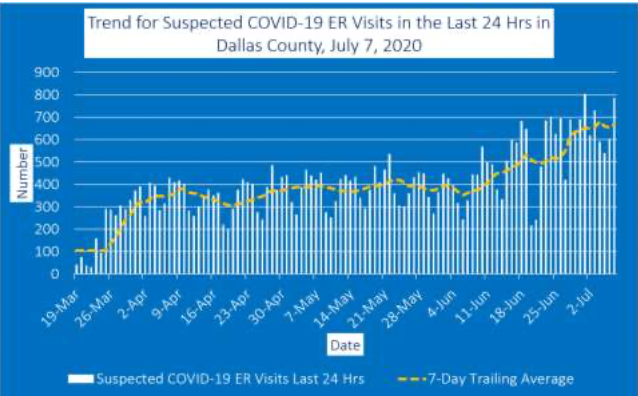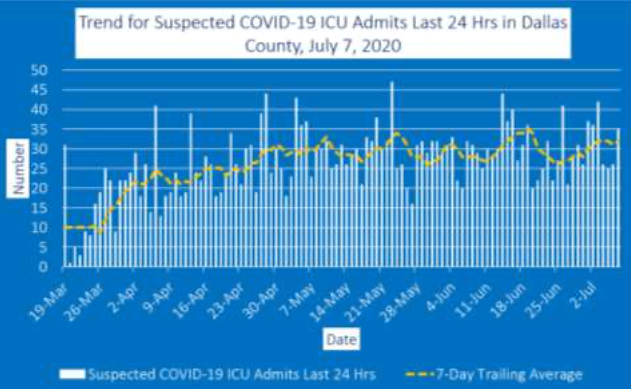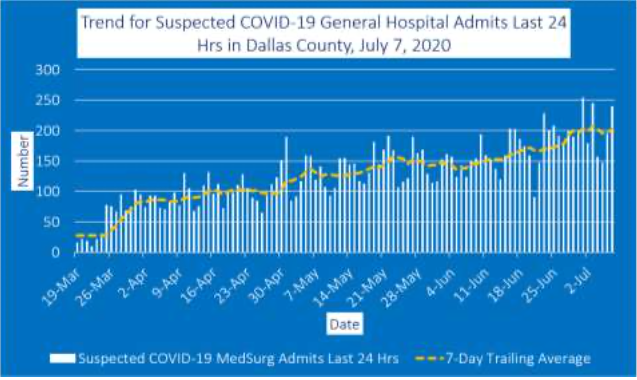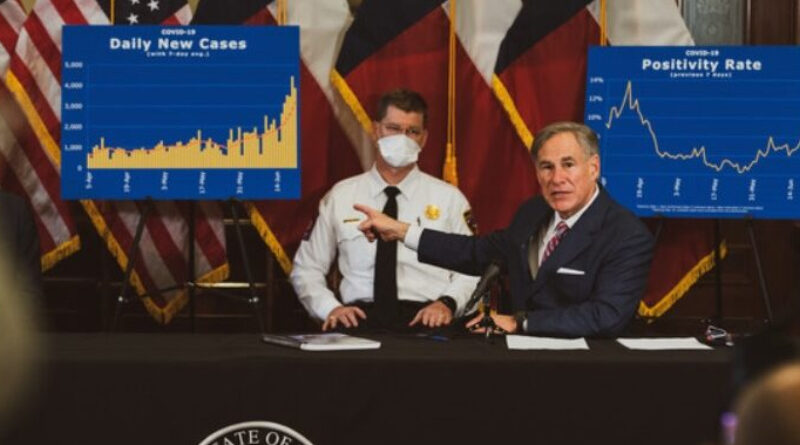Gov. Abbott Signals Support as Austin Considers Fines For Not Wearing Masks
As Dallas County continues to report record-high COVID-19 hospitalizations and officials work to contain the spread, there’s a lot of information to take in. Here are today’s bullet points:
- Gov. Abbott signals support as Austin considers fines for not wearing masks;
- Dallas County reports 1,029 COVID-19 cases, 16 new deaths;
- Study: Drug therapy assists critically ill COVID-19 patients at Texas Health Dallas;
- Abbott allocates emergency education relief funding for Texas higher education;
- Chalk art brings inspirational messages to Mockingbird Station.
Gov. Abbott Signals Support As Austin Considers Fines For Not Wearing Masks

Gov. Greg Abbott showed support Wednesday to Austin officials considering additional enforcement of a recent order Abbott issued requiring masks be worn in most public spaces statewide.
The Austin-American Statesman reported the city of Austin will consider measures that would “allow for a fine of up to $2,000 for anyone violating a ‘health authority rule’ like not wearing a mask” and another that would “allow the city to take civil action against any person who maintains a business or site that does not comply with minimum health standards.”
In a letter to Austin Mayor Steve Adler as reported by the Texas Tribune, Abbott called the measures Austin is considering “an important step toward reducing the spread of the novel coronavirus (COVID-19).”
“Local officials do need to step up and enforce these executive orders knowing the executive orders that have been issued were intended to slow the spread in the state of Texas without having to close down. The measures that I saw the city of Austin contemplating were measures that actually would be enforcing these protocol standards,” Abbott told KXAN. “The last thing that we can and should do is to close down. It is my understanding that the mayor has made clear that he understands that any attempt to close businesses back down into a lockdown or stay-at-home standard would be in contradiction of my executive order.”
Dallas County Reports 1,029 COVID-19 Cases, 16 New Deaths
Dallas County Health and Human Services Wednesday reported 1,029 additional positive cases of COVID-19, bringing the total case count in Dallas County to 29,160, as well as 16 additional deaths.
Five of the dead reported Wednesday were from Grand Prairie, six were from Dallas, two were from Garland, and one each were from Farmers Branch, Coppell, and Mesquite. Officials say 14 of those 16 had been hospitalized and 13 of the 16 had underlying, high-risk health conditions. The dead ranged in age from a 20-something-year-old woman with no underlying health conditions to three people in their 80s. One of the 16–a Coppell woman in her 60s–died in an area hospital emergency room, another–a woman in her 50s–died in the Dallas long-term care facility where she lived, as did a man in his 80s. Of the 426 total deaths reported to date, about a third have been associated with long-term care facilities.
An increasing proportion of COVID-19 cases in Dallas County are being diagnosed in young adults between 18 and 39 years of age, such that of all cases reported after June 1, half have been in this age group. Increasing reports of cases are continuing to be associated with multiple large recreational and social gatherings since the beginning of June, including house parties.
County officials continue to report record-high numbers of COVID-19 inpatients in hospitals with 771 COVID-19 patients in acute care for the period ending July 7.
Additionally, the number of emergency room visits for COVID-19-like symptoms in Dallas County increased by almost 200 to 786 emergency room visits in the 24-hour period ending July 7, which represents almost 35% of all emergency department visits in the county, according to information reported to the North Central Texas Trauma Regional Advisory Council.
“Today for the sixth day in a row we are over 1,000 new cases of COVID-19 in Dallas County and unfortunately, we’re reporting 16 deaths, including a woman in her 20’s and a man in his 40’s without underlying high-risk health conditions. This is an extremely critical time in our battle against COVID-19. We expect to see more cases in the coming days and how high this surge goes is dependent on each of us doing our part,” Dallas County Judge Clay Jenkins said. “In the government, it means following the advice of both the medical experts who are tasked with treating COVID-19 patients in our hospitals and the public health authorities in the counties most affected by the COVID-19 surge. For individuals, whether leaders at home or leaders in the workplace, it means following the best advice: always wearing a mask when outside the home and around other people, and downloading, printing and using daily the color-coded chart that can be found at www.DallasCountyCOVID.org when making our decisions.”
Dallas Mayor Eric Johnson shared Wednesday that 25 hospitals reported their bed and ventilator capacity statistics to the city. Of 6,106 total beds, 68% were occupied, of 968 total ICU beds, 70% were occupied, and of 959 total ventilators, 365 or 38% were in use.



Of the cases requiring hospitalization to date, more than two-thirds have been under 65 years of age. Diabetes has been an underlying high-risk health condition reported in about a third of all hospitalized patients with COVID-19.
Of cases requiring hospitalization who reported employment, over 80% have been critical infrastructure workers, with a broad range of affected occupational sectors, including healthcare, transportation, food and agriculture, public works, finance, communications, clergy, first responders, and other essential functions.
The percentage of respiratory specimens testing positive for the novel coronavirus increased to 32% among symptomatic patients presenting to area hospitals in week 26.
Dallas County Health and Human Services shared on social media Wednesday some information clarifying how the county reports test results.
(1/3) DCHHS has received questions about how we report #COVID cases. Here are the key takeaways:
— Dallas County HHS (@DCHHS) July 9, 2020
1. DCHHS only reports positive PCR test results. DCHHS does not include antibody test results in our daily COVID cases.
DCHHS shared that they don’t include antibody test results or “probable” cases in the daily COVID-19 case count.
DCHHS also only reports one positive result for those who’ve received multiple tests for COVID-19. They use software to identify people who have received multiple tests (by matching name and birthday) and eliminate any repeat results from the daily reports.
Statewide, 220,564 cases have been reported from 2,258,708 tests as of July 7, as well as 2,813 fatalities. There are 9,610 COVID-19 patients in hospitals across the state.
Study: Drug Therapy Assists Critically Ill COVID-19 Patients at Texas Health Dallas
A combination of medications given to critically ill COVID-19 patients — as they’re being put on a ventilator for severe respiratory failure — has shown a promising success rate, according to researchers on the COVID-19 ICU team at Texas Health Presbyterian Hospital Dallas, where the patients were treated.

The findings are published in Critical Care Explorations, a journal of the Society of Critical Care Medicine.
“We are pleased that our approach has helped to reduce mortality in patients on mechanical ventilation compared with other treatments,” said Dr. Munir Hazbun, pulmonologist on the Texas Health Dallas medical staff and lead author of the study.
Twenty of the 21 patients (95%) were reportedly able to come off ventilators after a median duration of eight days; 19 have gone home or to a post-acute care setting and two have died (since the article was published), for a mortality rate of 9.5%. This compares to mortality rates upward of 30%-50% for critically ill COVID-19 patients in published studies from pandemic hot spots.
The Texas Health Dallas researchers say their approach could have broader implications and add to the growing body of research, such as the RECOVERY Trial on dexamethasone, part of a randomized clinical trial in the U.K. to test a range of potential treatments for COVID-19.
The researchers, members of the hospital’s COVID-19 ICU team, treated the group of patients on ventilation with a combination of two drugs. The multidisciplinary team of physicians, pharmacists, and nurses administered tocilizumab, an immunosuppressive drug, in combination with methylprednisolone, a corticosteroid, soon after the patients were intubated.
Abbott Allocates Emergency Education Relief Funding For Texas Higher Education
Abbott Wednesday announced that the state will invest $57 million in federal funds to maintain the state’s need-based financial aid programs and keep more students enrolled at their colleges and universities.
The investment of federal funds, advanced by Abbott, Lt. Gov. Dan Patrick, Speaker of the House Dennis Bonnen, and legislative budget writers Senators Jane Nelson and Juan “Chuy” Hinojosa and Representatives Giovanni Capriglione and Oscar Longoria, will offset potential coronavirus-related cuts to key state financial aid programs, including TEXAS Grants, Texas Educational Opportunity Grants, and Tuition Equalization Grants.
The funding comes from the Governor’s Emergency Education Relief Fund made available through the Coronavirus Aid, Relief, and Economic Security (CARES) Act.
“As Texas responds to the economic and educational impacts of COVID-19, we want to make sure that students who depend on financial aid continue to receive the support they need to earn their college degree,” said Abbott. “This funding will help keep our students on the path to finishing their education and entering the workforce with knowledge and experience that will help them launch productive careers and attract more employers to our state. These grant programs provide targeted investments in Texas students and in the future of our state.”
“Keeping Texas students on track to earn high-value credentials is vital not only for those students and their families but also to help accelerate the state’s economic recovery,” said Commissioner of Texas Higher Education Harrison Keller. “Thanks to the leadership of Governor Abbott and the collaborative efforts of Lieutenant Governor Patrick, Speaker Bonnen, the Chairs and Vice-Chairs of the Finance and Appropriations Committees and other legislative leaders, this strategic investment in students will translate directly into a stronger, more resilient workforce for the future. Our institutions are committed to keeping students on the path to earning a credential, and each of these grant programs provides critical support for that mission.”
“Today’s funding maintains our solid investment in our higher ed students and in Texas’ future. These are tough times but we must do all we can to keep every Texas student on track,” said Patrick.
“In the midst of an unprecedented pandemic, one of the most important drivers in jumpstarting our state’s economic recovery is Texas students having the ability and financial support needed to pursue a college degree or certificate and enter our state’s workforce with high-quality, productive careers ahead of them. This relief funding serves not only as a strategic investment in our students and the families who support them, but in the future resiliency of our state’s storied economy and workforce. I am proud to join state leaders in supporting the continuity of these critical financial aid programs and believe they will go a long way to mitigate the adverse impacts of COVID-19 on our economy and higher education system,” said Bonnen.
As for K-12, state Rep. Morgan Meyer wrote a letter Wednesday to Texas Education Agency Commissioner Mike Morath about the possibility the TEA may resume STAAR testing in the 2020-2021 school year.
“Continuing the pause in testing will allow our public schools, administrators and teachers to continue focusing on the health, safety, wellness and learning of our students.” Meyer wrote in the letter. “However, if STAAR testing must resume, then I request that TEA eliminate the high stakes and negative consequences for students, including prohibiting advancement to the next grade, preventing students from graduation or impacting students’ eligibility for Talented and Gifted programs.”
After hearing from Dallas ISD and Highland Park ISD families across our district, I’m asking Texas Education Agency…
Posted by Morgan Meyer on Wednesday, July 8, 2020
He added that he intends to file a bill “that protects students from punitive action based on STAAR test results.”
Meyer’s letter comes after the TEA released additional guidance for back-to-school.
Check back at peoplenewspapers.com for a full story about STAAR testing later today.
Chalk Art Brings Inspirational Messages To Mockingbird Station
Lastly, as usual, we end today’s digest with a bit of good news. Tenants and customers at Mockingbird Station recently were welcomed by chalk art.

The shopping center, which houses restaurants, retail stores, and more, has felt the effects of COVID-19 and recently welcomed the community back by hosting a live chalk art exhibition by mother-daughter art duo Jan and Olivia Riggins.
The artists created five chalk art pieces throughout the station. The pieces included a series of inspirational messages highlighting community and hope.










